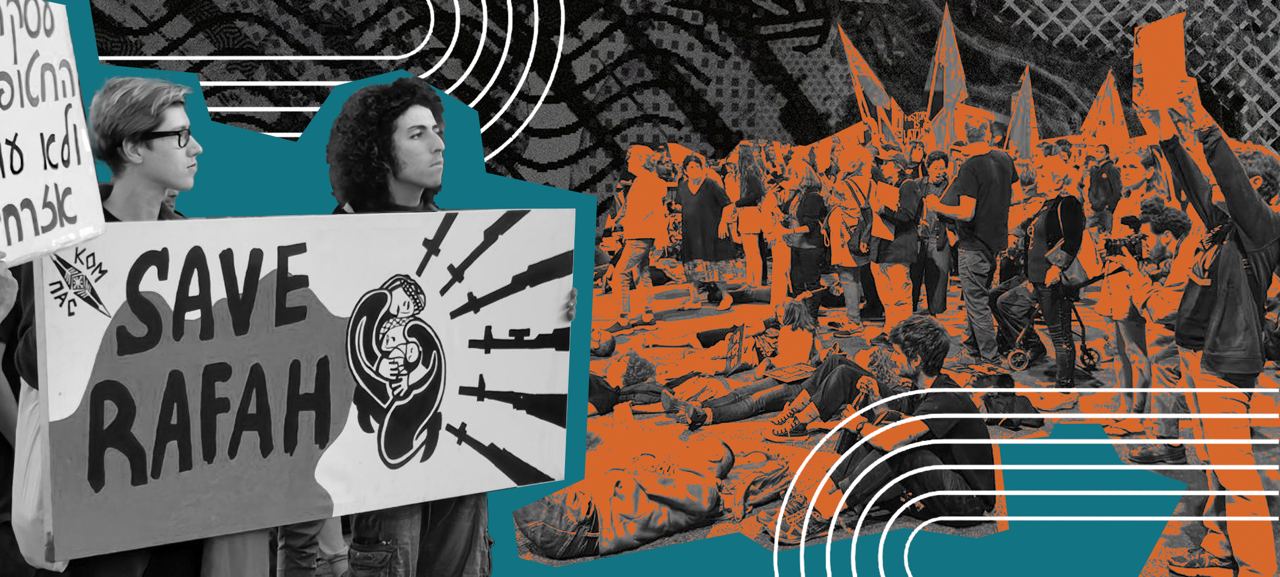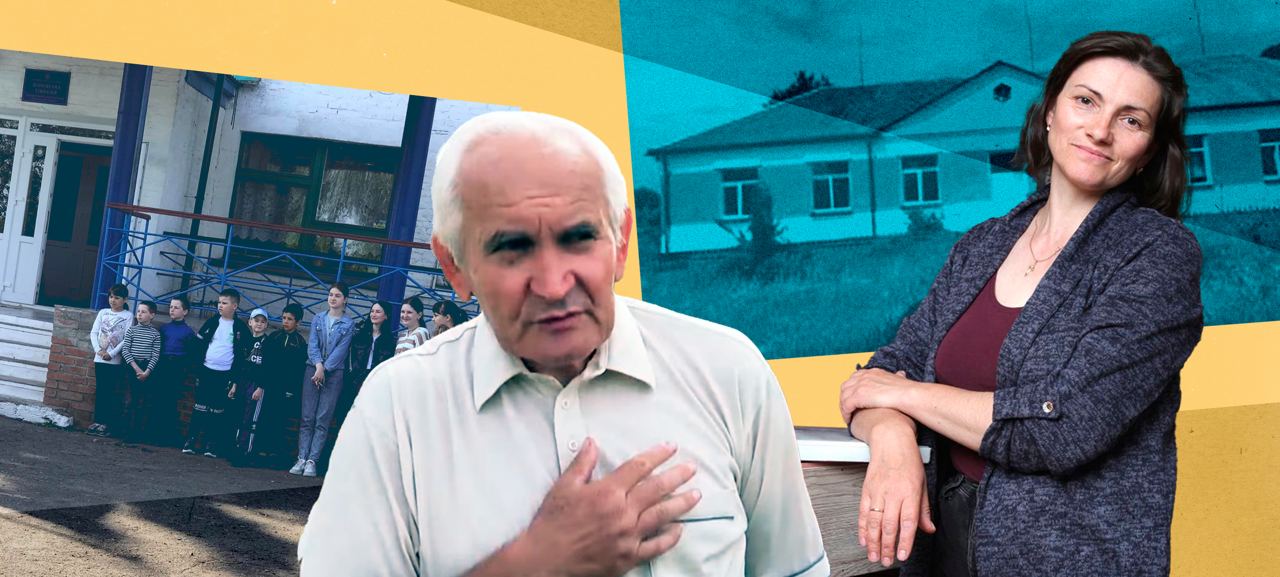Both the war and the economic problems have led to the introduction of a number of controversial reforms in the social sphere. A new labour law has made life for employees significantly more difficult. Healthcare and education reforms are also noticeable, with hospitals and schools often being closed on account of these reforms. Those and other factors are forcing citizens to defend their interests, regardless of the difficult conditions caused by the Russian invasion and its impact. Among those who oppose arbitrariness, it is often easy to find ideas-led citizens who are driven not so much by personal but by public interests. Believing that their efforts could lead to a better future, people are encouraged to contribute to a socially important cause, look for new ways to counteract arbitrariness and unite with the others who are also concerned. The examples of citizens' struggle for public interests, peculiarities of communication and motivation can be found in our article.
School liquidation led to unity
This case is an example of how motivated citizens spontaneously made an attempt to defend their favourite educational institution. The school in question is the Ihor Hereta Ternopil Regional Experimental Integrated Comprehensive Art School, one that teachers and parents have been trying to protect from ‘reorganisation’, that is, essentially liquidation, for six years. Thanks to the community's efforts, significant results were achieved — the Supreme Court canceled the order of the regional council on reorganisation. However, the school has not yet resumed its work.
It all started in the year 2018, when the regional council decided to reorganise the school by merging it with another educational institution. This was done without any public hearings. Outraged parents and teachers came out to protest, determined to defend the school with a unique educational program approved by the Ministry of Education and Science and the Ministry of Culture. This program, in addition to general secondary education, gave children the opportunity to study art on an advanced stage of learning.
Iryna Lenko, a former teacher at the regional art school, told Commons that at first, neither parents nor teachers had a clear plan of action on how to protect the school, so they made decisions rather spontaneously. Within one day, they had managed to collect 700 signatures in support of the school's preservation. Additionally, letters were sent to a number of ministries and to the Cabinet of Ministers of Ukraine, and three appeals were filed with the court. The school's activists received support from citizens, ATO veterans, and Ukrainians abroad, while also organising protests regularly.
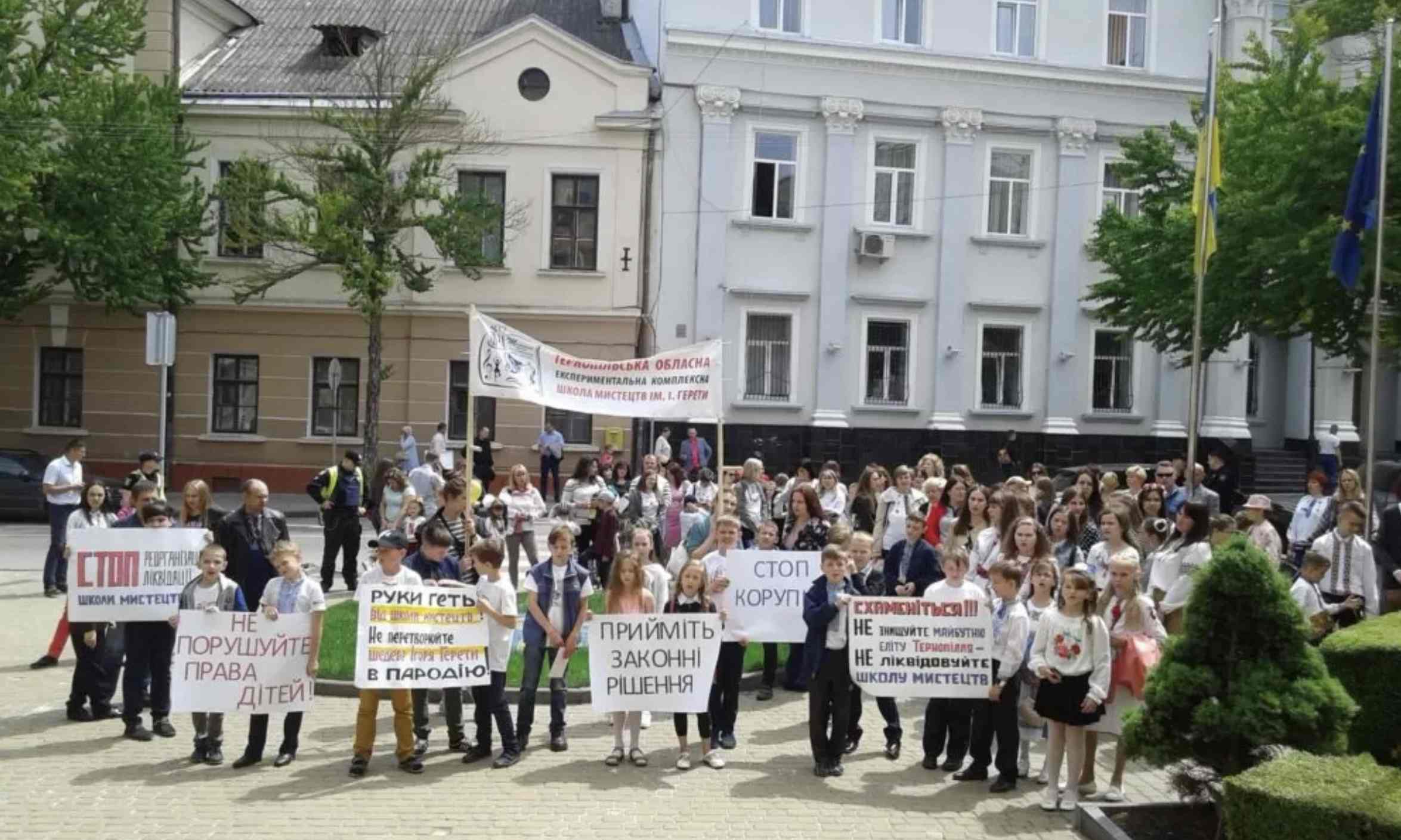
A protest action near the walls of the Ihor Hereta Ternopil Regional Experimental Integrated Comprehensive Art School. Photo: provse.te.ua
However, the very first phase of the confrontation did not end in favour of the community. The Ternopil District Administrative Court at first, and the Eighth Administrative Court of Appeal later, dismissed the community's claims. Iryna Lenko herself, as a leader, was put under pressure and was stripped of her title of ‘senior teacher’ according to an official order. Nevertheless, she succeeded in having this order being canceled in court. Overall, Iryna Lenko says she has experienced many difficult situations in recent years of her struggle. Meanwhile, the number of people who supported her was decreasing, as many eventually lost faith in the possibility of defending the school.
‘It is difficult indeed when you have everyone working against you: the city council, the regional administration. Yet, you either have to take it on and go all the way, or not take it on at all… At the same time, legal means only are available to us, while some government officials are ready to resort to any method. They are only afraid of power, that is, the power of the masses,’ she told Commons.
Iryna Lenko explains her active engagement in the defence of the school as a desire to fight for the public interest and ensure that the rule of law is upheld in the country. ‘This concerns not only the educational field, but it concerns all citizens of Ukraine, who are supposed to be the only source of power and who are essentially powerless. And we are witnessing how the laws and the Constitution are being ignored,’ the woman said. She is convinced that it is precisely the passivity of society that allows the authorities to neglect public interests.
At the moment, the situation around the regional school of arts remains unsettled, with no final win for either side. There is the ruling of the Supreme Court, which, unlike the courts of previous instances, cancelled the decision of the Ternopil Regional Council to reorganise the educational institutions. Then there is the second ruling of the Supreme Court, which denied the review of the case ‘due to newly discovered circumstances’, once again justifying the school's defenders. Nevertheless, the local authorities remain in no hurry to reopen the school, which has forced people to defend the truth in court once again. Iryna Lenko herself continues to take an active part in court hearings and provide legal support to education workers. Following her initiative, teachers in one of the region's communities managed to get the local administration's order to close and ‘optimise’ ten schools canceled.
Transparency and public support
In contrast to the defenders of the regional art school, there are associations that were formed specifically to defend public interests and do so on a regular basis. We will look closer at how such initiatives are organised. As one such example is the Be Like Nina social movement, which brings together healthcare professionals. The movement's members provide daily consultations to both individual healthcare professionals and entire teams, while also providing legal support to those who go to court. Oksana Slobodiana, the leader of the Be Like Nina movement, said that in order to establish effective work of any association, the following basic principles must be followed: openness, documentation, and communication.
‘You have to speak openly about every step you take. In this way, people will trust you completely. At the same time, it is not guaranteed that this will protect you in the future, so you need to be prepared for possible attacks, as people have the ability to twist everything in their own way. That's why documentation exists. It is a document that can help you protect yourself morally, not to mention legally,' she told Commons.
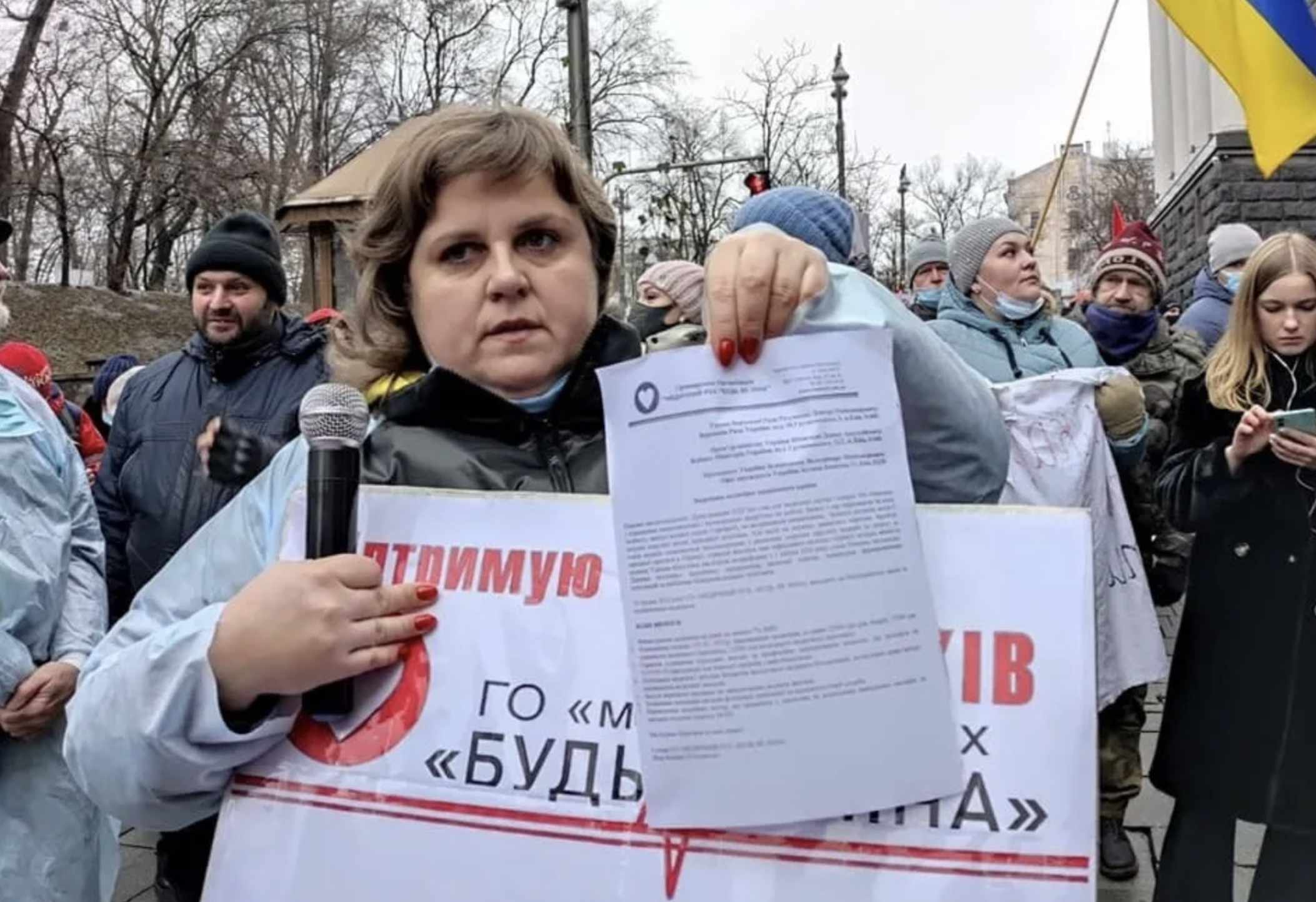
Oksana Slobodiana, head of the Be Like Nina social movement, during a protest in Kyiv. Photo: medryh.com.ua
According to Oksana Slobodiana, it is handy to use groups in different messengers to communicate among like-minded people. This allows citizens to track all the actions of the organisation, see the level of openness, and compare the stated requirements with the results of actions. Initiative and mutual understanding in the team also play a significant role.
‘People will complete a certain task if you set it clearly, even when it comes to short-term tasks, such as a trip or writing an appeal, etc. That's why there is a lot of difficulty in people's activity, and it all needs to be organised,’ she said.
Financial support is another aspect. Oksana Slobodyana suggests immediately discussing and documenting all matters related to the future funding. However, motivation of citizens is important during the first phase. For example, the Be Like Nina movement, according to Slobodiana, existed for the first two years at the expense of its participants. It is clear that protecting public interests, in addition to health, energy, time and money, requires participants to counteract the interests of government and business structures, which inevitably leads to making enemies. Nevertheless, many citizens are ready to act despite the difficulties, as protecting the public interest is a priority for them. Oksana Slobodiana is one of them, as well as many other healthcare professionals who want to make positive changes in the healthcare sector.
‘There are many doctors and nurses in our association who have themselves faced difficulties at workplace where they want to provide medical care to patients, providing them with normal conditions so that they can be cured. These people want to live in Ukraine. At the same time, their personal goals shrink away. Indeed, if you do something, you do it for people and you are responsible to them. And once you take responsibility, you can't do otherwise,’ she said.
At the same time, Slobodiana considers the public's support to be crucial. She is confident that if the population draws attention to a socially significant problem, such as the closure of a hospital, it will become much more difficult or even impossible for the authorities to ‘optimise’ the medical facility. We have already covered one such case in the town of Sosnivka, Lviv region.
‘With the active support of the public, the authorities will be less inclined to close the medical facility or will try to understand the situation more deeply. However, in order to gain the support from the public, communication must be established between healthcare professionals and the public. Local Facebook groups should be set up to inform people about the situation along with suggestions for action so that the public is aware and interested in supporting them,’ said Oksana Slobodiana. She also emphasises that it is wrong to wait until the war is over before starting to address medical care and other acute social problems, as it could be too late.
The power to organise
Based on the experience of members of the NGO Social Movement, we will discuss how to build effective interaction within a team of like-minded people to protect the public interest. The members of this human rights organisation see their main task in overcoming social inequality and exploitation, and therefore focused their activities on defending the interests of workers throughout Ukraine. According to Vitaliy Dudin, a PhD in law and activist of the Social Movement, most of the problems that concern ordinary people are widespread and rooted in capitalist relations. The tension is getting worse due to the actions of the state, which is increasingly supporting the interests of employers and capital owners. This situation, according to the human rights activist, shows that the state does not fully fulfil its functions of protecting the public welfare.
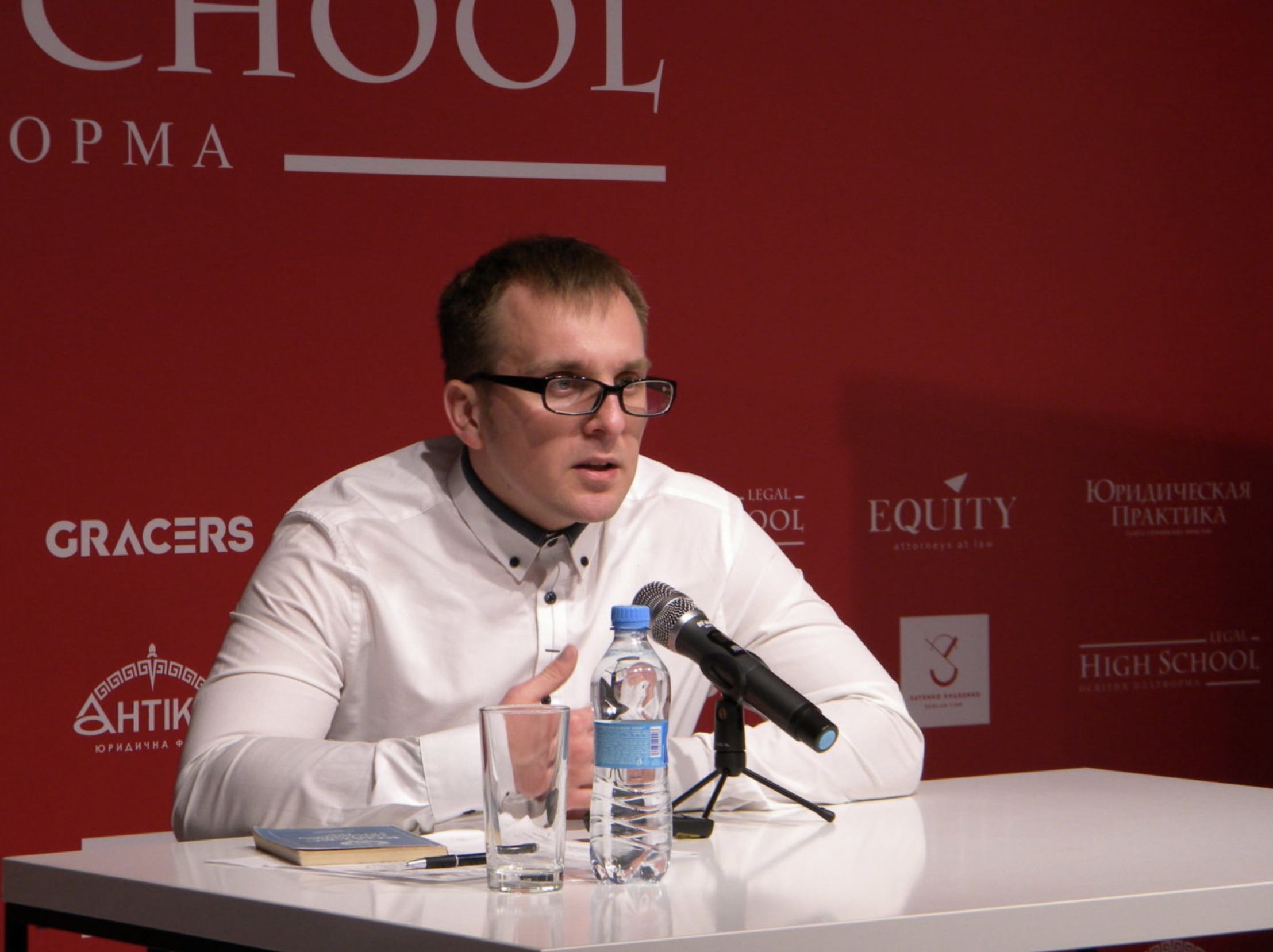
PhD in law, activist of the Social Movement Vitaliy Dudin
In order to achieve the goal of protecting social and labour rights, Vitaliy Dudin believes that, apart from going to court, it is important to involve the public by raising awareness and highlighting problems, which will allow solving these problems more effectively. He urges that citizens should not neglect the opportunity to appeal to the authorities, despite their usually indifferent reaction to the difficulties of ordinary people.
‘In order to advance the issue around Law No. 2980, the problem of failed compensation for critical infrastructure workers and their families affected by Russian attacks, we used various means, including requests for public information to the Pension Fund, complaints to the Ombudsman, appeals to the Ministry of Social Policy and the authors of the law. Their responses helped us to better understand the roots of the problem and provide convincing arguments for taking specific cases to court. We voiced all our demands in the media in order to get the right reaction from the authorities,' Vitaliy Dudin told Commons.
Establishing interaction between its members is of great importance in organising an association, and collective decision-making is an important aspect of this process. Vitaliy Dudin believes that the management should be decentralised and that the main role in decision-making should be given to the entire asset, not to a single leader.
‘Internal democracy is the key to an organisation's efficiency and sustainability. If an organisation is overly centralised, it may at first be effective when responding to certain challenges, but later it may find itself in a crisis when, say, a leader burns out or many people start to feel redundant. That is why democracy cannot be ignored. There should be a collective decision-making process, division of functions, internal training, internal reporting and transparency. It is necessary to implement mechanisms that will not allow the leader to make fateful decisions for the organisation without taking into account the opinions of other participants,’ he said.
According to Vitaliy Dudin, Social Movement is managed by a seven-member governing body (the Council), which is renewed annually (usually with more than half of the members replaced). The Council makes operational decisions on fundamental political statements, action plans, finances, responsible persons, etc. The lawyer also believes that there should be no hierarchy in an organisation of like-minded people, no strict division into ‘thinkers’ and ‘doers’. Every activist, he believes, should feel involved in decision-making so that everyone has the opportunity to express their opinion.
At the same time, Vitaliy Dudin emphasises the importance of leadership qualities. At a time when uncertainty prevails in many areas in Ukraine, it is strong-willed and proactive individuals who should set the direction of the organisation, focusing on long-term strategies and prospects.
‘Being a leader in today's urgent environment does not mean doing what everyone likes or listening to everyone. Very often, it requires a clear definition of priorities and the ability to persuade people to act in conditions when they are not ready, not able or not willing. If an organisation has set out to change attitudes towards the interests of certain professional groups, it will, of course, experience many challenges and frustrations along the way. An organisation that grows despite the difficulties, attracts resources that meet the challenges, and reaches a new level is an effective organisation. And if the network of activists does not expand beyond a comfortable circle of friends, then the prospects of such an organisation look sad,’ Vitaliy Dudin said.
The human rights activist noted that one of the underestimated problems of any organisation is the problem of growth. It refers to cases when an organisation is initially created on the basis of a comfortable circle of friends, but over time it becomes clear that the tasks become more serious and they can only be resolved by an organisation that works systematically, exerts all its strength and does not depend on the inspiration of individuals. Another important aspect to consider is the availability of resources. According to the lawyer, there are a number of routine functions in any organisation that should be delegated to someone on a paid basis, for example, reporting.
Regardless of the numerous difficulties faced by Ukrainian society in the course of protecting social rights, there are positive trends. Vitaliy Dudin emphasises that the demand for justice in society is growing, as is the will to fight for it directly. This is also influenced by the current situation of war, which has made the state of struggle permanent.
‘I believe that the public today demonstrates unity, sacrifice and readiness to defend their rights. Often, citizens do not know how to do this effectively, but they do not doubt the validity of this path, as the situation is largely hopeless. Giving up the fight for social interest is a defeat in the struggle for a better Ukraine,’ he concluded.
***
The current situation is such that there are many initiatives and decisions adopted at the state and local levels that do not always meet the interests of society. Therefore, the active participation of citizens in dealing with socially important issues is crucial. Public engagement will not only allow citizens to influence the adoption of important public decisions, but will also force the authorities to take into account the interests of the population and take into account people's opinions.
Of course, the situation in Ukraine is currently different from that in the European Union, where trade union movements have a significant influence and the authorities are forced to take their position into account. However, changes are slowly happening. The crisis of recent years has been an important accelerator of these changes, as it has exposed numerous social problems along with the inability of government institutions to respond adequately to the urgent needs of the population. This has resulted in the appearance of many people in the country who are aware of the urgent need for just reforms and are ready to act, often against their personal interests. Most importantly, regardless of the outcome, such initiatives resonate with society because they are aimed at improving lives and taking care of the future.
Author: Oleksandr Kitral
Cover: Kateryna Gritseva

